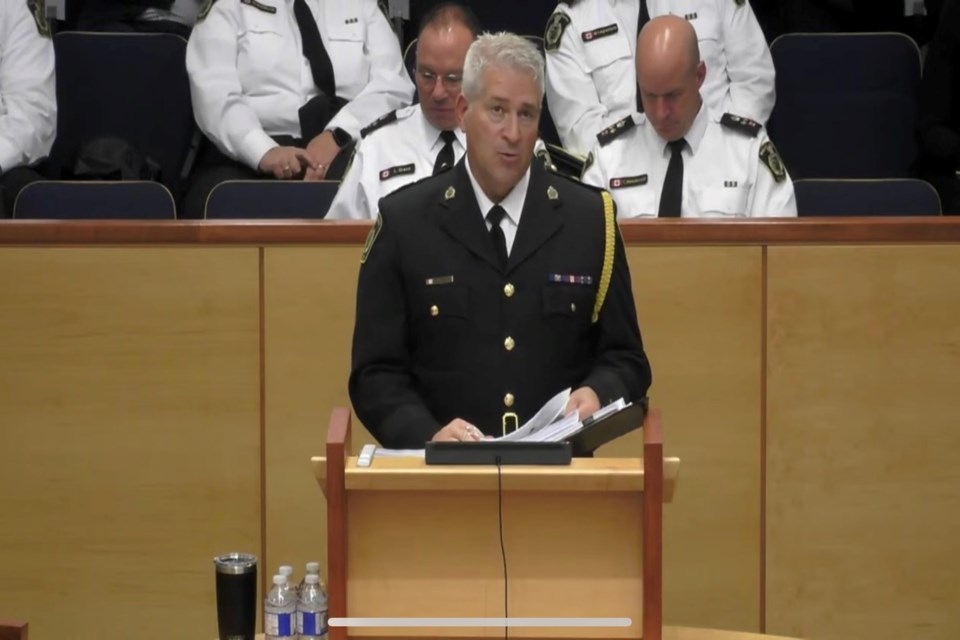Niagara Region has approved a $213.3 million police budget, an increase of more than 13 per cent compared to last year’s operations — an amount Regional Chair Jim Bradley said would likely enrage taxpayers.
This is after $3.65 million (1.9 per cent) was trimmed at the request of regional councillors during a budget review at a committee-of-the-whole meeting last week.
The reduction was made possible by phasing in the hiring of 33 new front-line officers, deferring the salaries to next July.
The initial increase presented by police chief Bill Fordy was 15.1 per cent.
Fordy cited a number of factors for needing an increase of resources, such as projections that the region’s population will grow to 700,000 people from the current 530,000 by 2051.
There are an additional 30,000 people as a result of Brock University and Niagara College, as well as many seasonal residents across Niagara, he said.
Niagara is a busy tourist destination, has four border crossings and is surrounded by water, Fordy, added, and there it is a host of special events such as Canal Days in Port Colborne and the Grape and Wine Festival, which both draw thousands of people each year.
“It would be irresponsible of me to simply maintain the status quo,” said Fordy, adding that police have been dealing with ever-increasing workloads in recent years.
The police chief told councillors there were 9,400 calls related to mental health in 2023 and 6,500 domestic calls that same year as well.
Niagara Regional Police have “not kept pace” with other police services in Ontario when it comes to resources, he said.
As a result of last Thursday’s debate, council will also request that the provincial government cover 5.7 per cent of the police budget, which adds up to more than $10 million and is equal to changes being mandated by the province.
Niagara-on-the-Lake Regional Coun. Andrea Kaiser asked a few questions of Fordy, one of them about how the NRP board’s costs compare to other police boards in the province. She said she’d like to see “how that weighs up against other communities.”
The NRP board budget is slightly less than $1.1 million, which covers staffing costs for two non-union full-time employees, consulting, professional development for board members and staff, board members honoraria and benefits, office supplies, travel, and membership dues, as well as legal fees, explained the report before council.
But the board budget also includes $460,000.00 for legal expenses, which represents 45 per cent of the total for 2025. The board is responsible for paying all legal expenses of the service, which are incurred as a result of human rights applications, contract negotiations, grievances, and legal indemnification costs for Service members.
Fordy said he didn’t want to “speak to what other agencies do” in response to Kaiser’s question, but Port Colborne Mayor Bill Steele, a member of the police board, stepped in and said that Kaiser’s questions could be answered and he will take her inquiry to his colleagues.
The amendment to request the province covers changes that add up to a 5.7 per cent increase was brought forward by St. Catharines Regional Coun. Laura Ip.
Chair Jim Bradley said it could be considered “unfair” that local taxpayers are burdened with this mandated increase.
“I think it’s quite reasonable to be able to ask them to do this,” said Bradley, who later noted that residents will likely be “enraged at an increase of this kind,” referring to the overall budget increase requested.
Untouched by cuts made by regional council last week are 11 detective positions, as well as nine speciality uniform positions, four new senior officers, and seven civilian positions.
The staggering of 33 new frontline hires adds up to .75 per cent of the general levy, which currently sits at about an 11 per cent increase when all different departments are considered.
Water and wastewater is set to increase by 12.27 per cent. Earlier this month, the budget committee approved in principle a 12.2 per cent increase to the combined water and wastewater budget. The gross operating budget for water and wastewater, including the increase, is $178 million.
As well, a 5.88 percent increase to the Niagara Transit Commission is being requested, attached to a budget that will bring the cost of transit to more than $60 million.
The Region’s capital budget of $376 million has been approved as well.
It is expected that the Region’s entire spending plan will be approved by council in December.


(1).png;w=120;h=80;mode=crop)
